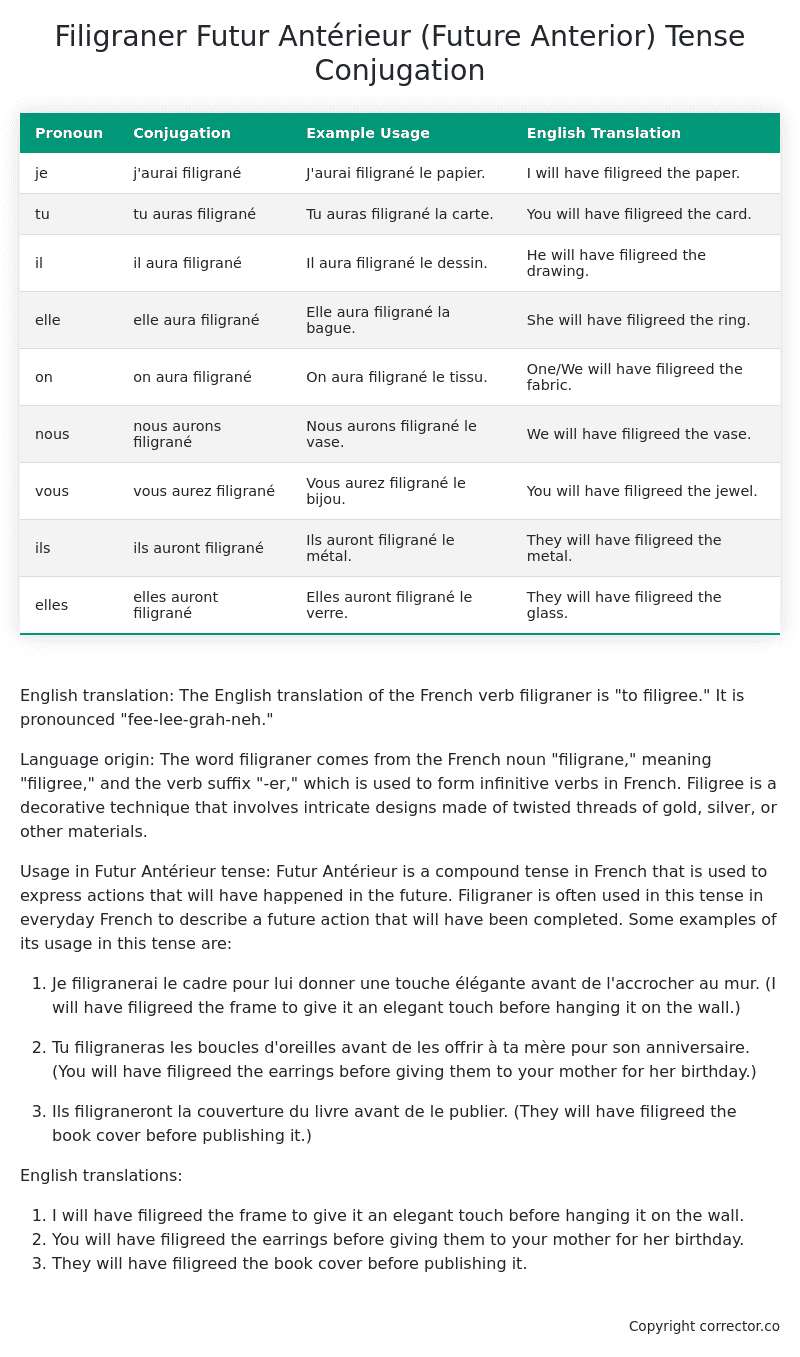Futur Antérieur (Future Anterior) Tense Conjugation of the French Verb filigraner
Introduction to the verb filigraner
English translation: The English translation of the French verb filigraner is “to filigree.” It is pronounced “fee-lee-grah-neh.”
Language origin: The word filigraner comes from the French noun “filigrane,” meaning “filigree,” and the verb suffix “-er,” which is used to form infinitive verbs in French. Filigree is a decorative technique that involves intricate designs made of twisted threads of gold, silver, or other materials.
Usage in Futur Antérieur tense: Futur Antérieur is a compound tense in French that is used to express actions that will have happened in the future. Filigraner is often used in this tense in everyday French to describe a future action that will have been completed. Some examples of its usage in this tense are:
-
Je filigranerai le cadre pour lui donner une touche élégante avant de l’accrocher au mur. (I will have filigreed the frame to give it an elegant touch before hanging it on the wall.)
-
Tu filigraneras les boucles d’oreilles avant de les offrir à ta mère pour son anniversaire. (You will have filigreed the earrings before giving them to your mother for her birthday.)
-
Ils filigraneront la couverture du livre avant de le publier. (They will have filigreed the book cover before publishing it.)
English translations:
- I will have filigreed the frame to give it an elegant touch before hanging it on the wall.
- You will have filigreed the earrings before giving them to your mother for her birthday.
- They will have filigreed the book cover before publishing it.
Table of the Futur Antérieur (Future Anterior) Tense Conjugation of filigraner
| Pronoun | Conjugation | Example Usage | English Translation |
|---|---|---|---|
| je | j’aurai filigrané | J’aurai filigrané le papier. | I will have filigreed the paper. |
| tu | tu auras filigrané | Tu auras filigrané la carte. | You will have filigreed the card. |
| il | il aura filigrané | Il aura filigrané le dessin. | He will have filigreed the drawing. |
| elle | elle aura filigrané | Elle aura filigrané la bague. | She will have filigreed the ring. |
| on | on aura filigrané | On aura filigrané le tissu. | One/We will have filigreed the fabric. |
| nous | nous aurons filigrané | Nous aurons filigrané le vase. | We will have filigreed the vase. |
| vous | vous aurez filigrané | Vous aurez filigrané le bijou. | You will have filigreed the jewel. |
| ils | ils auront filigrané | Ils auront filigrané le métal. | They will have filigreed the metal. |
| elles | elles auront filigrané | Elles auront filigrané le verre. | They will have filigreed the glass. |
Other Conjugations for Filigraner.
Le Present (Present Tense) Conjugation of the French Verb filigraner
Imparfait (Imperfect) Tense Conjugation of the French Verb filigraner
Passé Simple (Simple Past) Tense Conjugation of the French Verb filigraner
Passé Composé (Present Perfect) Tense Conjugation of the French Verb filigraner
Futur Simple (Simple Future) Tense Conjugation of the French Verb filigraner
Futur Proche (Near Future) Tense Conjugation of the French Verb filigraner
Plus-que-parfait (Pluperfect) Tense Conjugation of the French Verb filigraner
Passé Antérieur (Past Anterior) Tense Conjugation of the French Verb filigraner
Futur Antérieur (Future Anterior) Tense Conjugation of the French Verb filigraner (this article)
Subjonctif Présent (Subjunctive Present) Tense Conjugation of the French Verb filigraner
Subjonctif Passé (Subjunctive Past) Tense Conjugation of the French Verb filigraner
Subjonctif Imparfait (Subjunctive Imperfect) Tense Conjugation of the French Verb filigraner
Subjonctif Plus-que-parfait (Subjunctive Pluperfect) Tense Conjugation of the French Verb filigraner
Conditionnel Présent (Conditional Present) Tense Conjugation of the French Verb filigraner
Conditionnel Passé (Conditional Past) Tense Conjugation of the French Verb filigraner
L’impératif Présent (Imperative Present) Tense Conjugation of the French Verb filigraner
L’infinitif Présent (Infinitive Present) Tense Conjugation of the French Verb filigraner
Struggling with French verbs or the language in general? Why not use our free French Grammar Checker – no registration required!
Get a FREE Download Study Sheet of this Conjugation 🔥
Simply right click the image below, click “save image” and get your free reference for the filigraner Futur Antérieur tense conjugation!

Filigraner – About the French Futur Antérieur (Future Anterior) Tense
Construction
Common Everyday Usage Patterns
Interactions with Other Tenses
For example
Summary
I hope you enjoyed this article on the verb filigraner. Still in a learning mood? Check out another TOTALLY random French verb conjugation!


